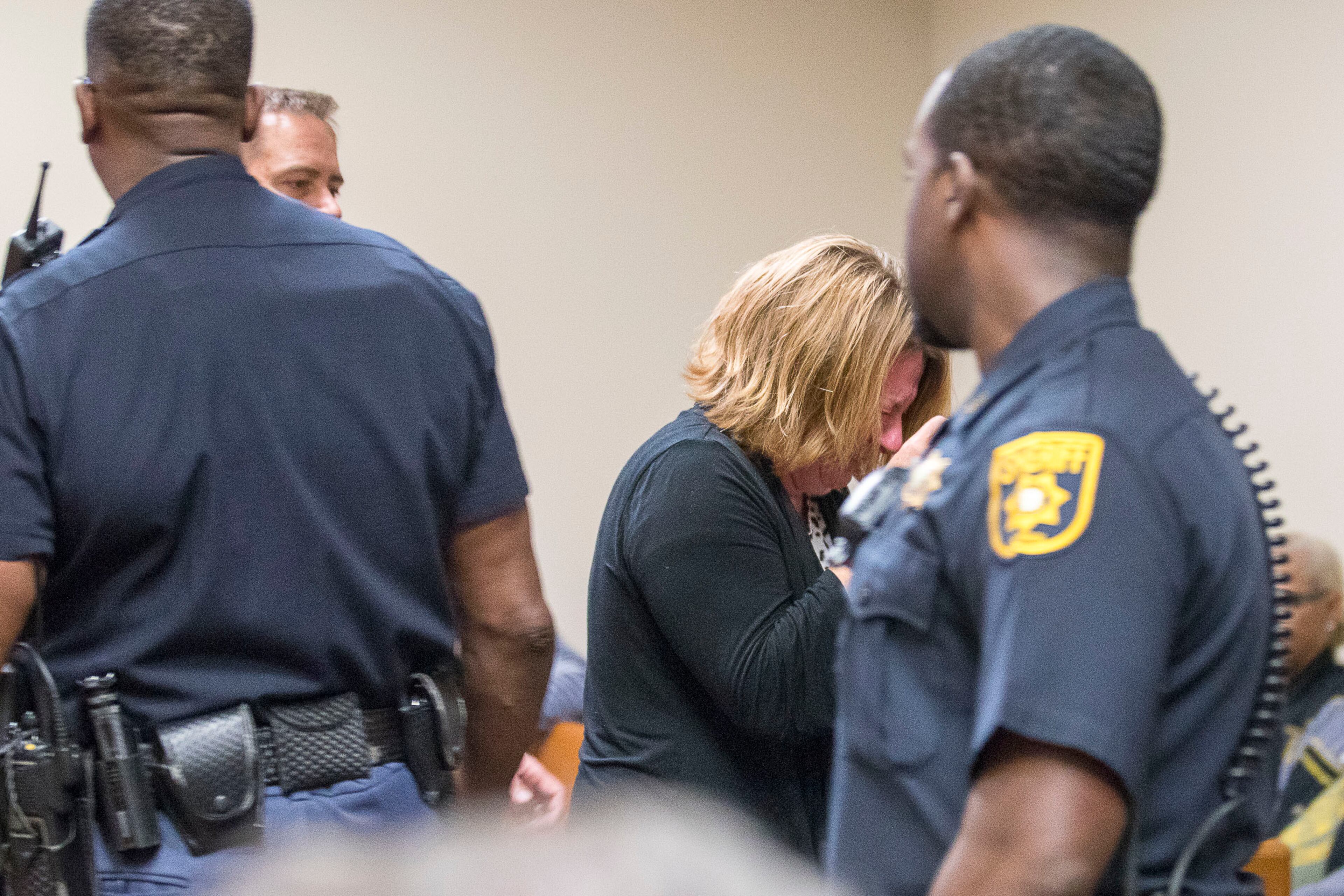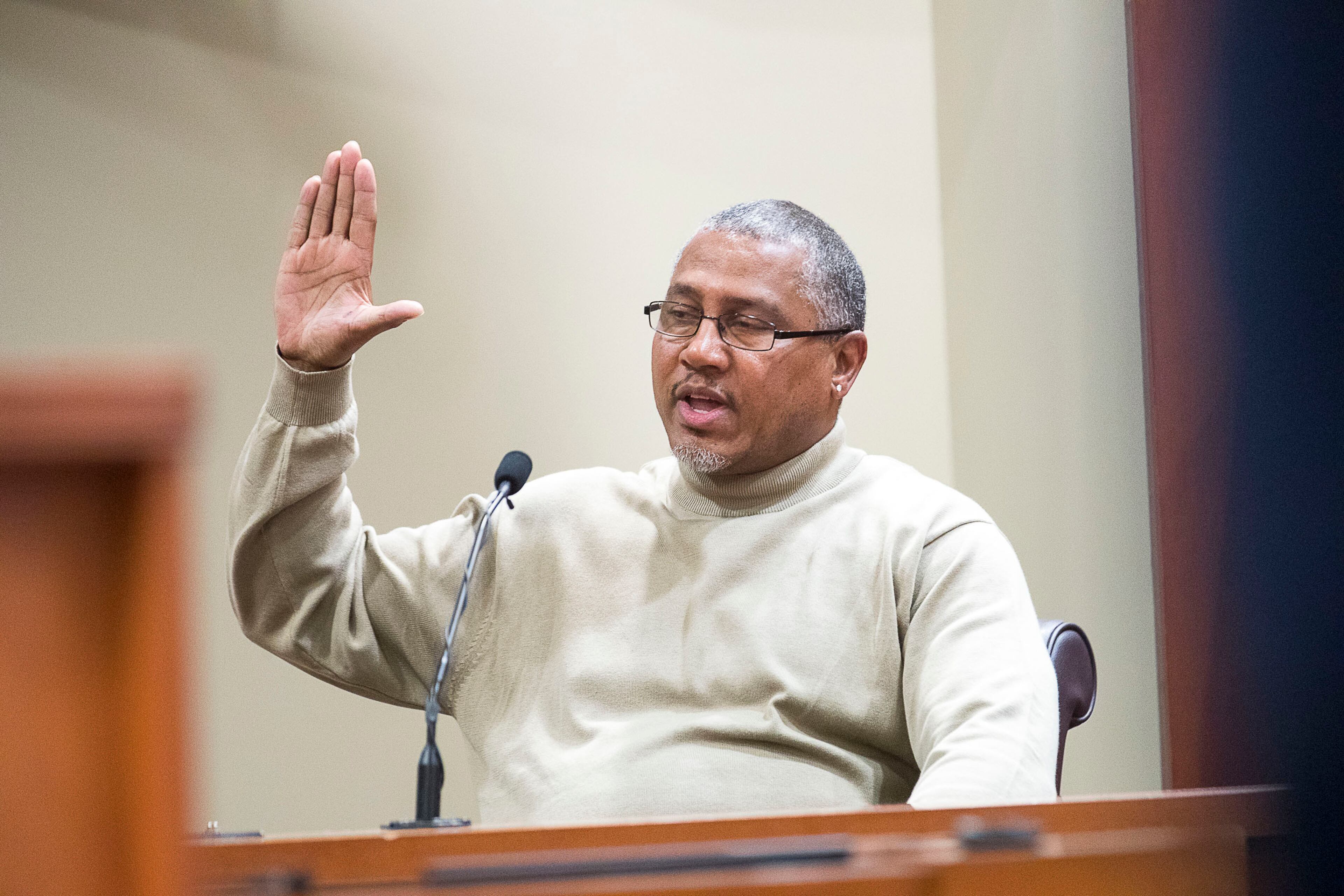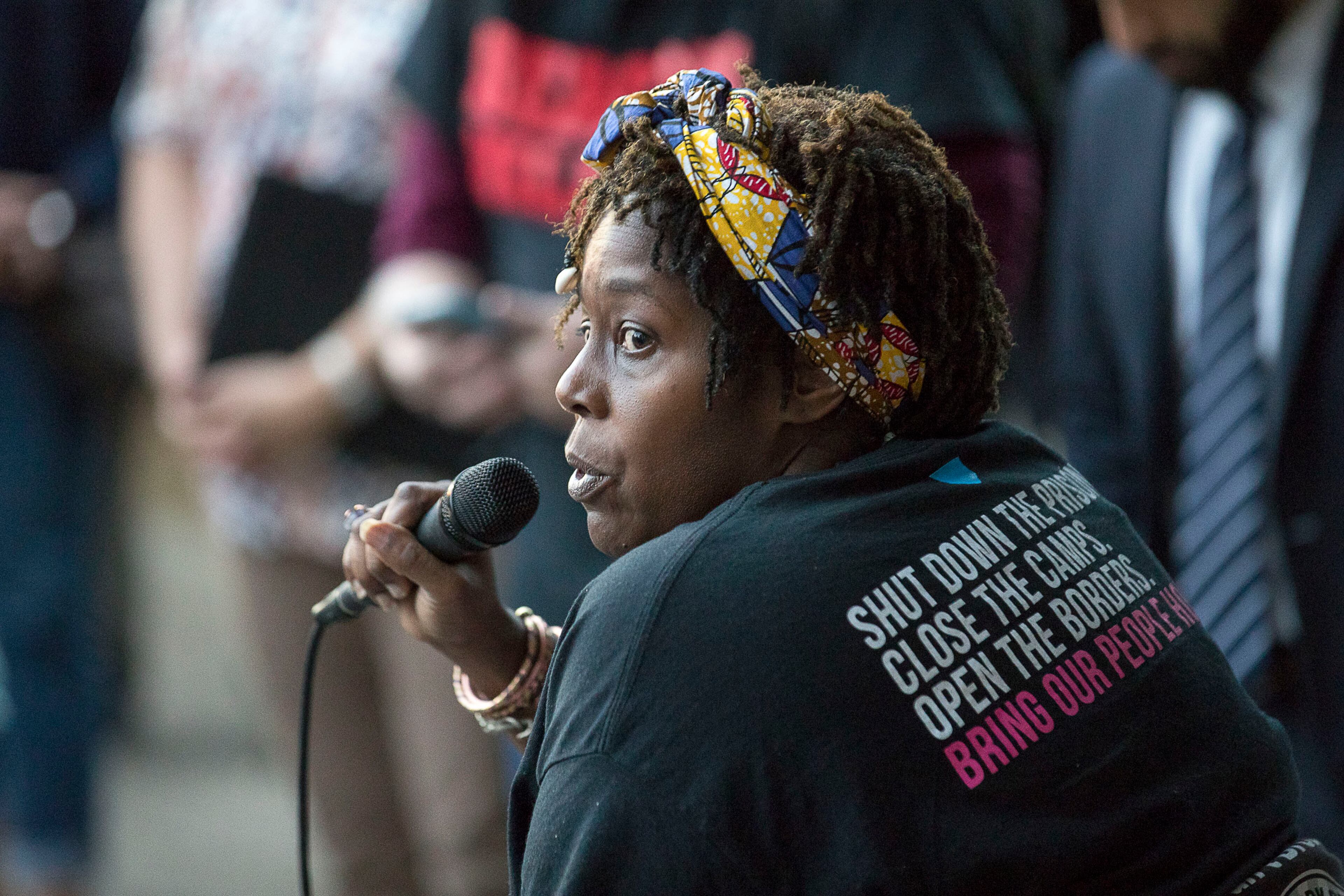Activists want judge deciding Olsen sentence to show no mercy























Disappointed that Robert “Chip” Olsen was acquitted on two counts of felony murder for the 2015 killing of a naked, unarmed and mentally ill veteran, activists are demanding that Judge LaTisha Dear Jackson deliver what they consider to be restorative justice.
Next week, Dear Jackson will sentence the former DeKalb County cop, found guilty of four lesser felonies. Those who believe Olsen got away with murder want him punished to the maximum extent: 35 years in prison.
Their lobbying campaign kicked off Thursday with a press conference at the state Capitol. Advocates have scheduled rallies outside the DeKalb County Courthouse, the judge’s home turf, for Wednesday and Thursday and plan to fill her courtroom on Nov. 1 for the sentencing.
“The proper punishment for taking a life in Georgia is a life sentence,” said attorney Gerald Griggs, speaking on behalf of the Atlanta NAACP. “She has the opportunity to send him a message: 30 years plus five.”
In Georgia, a prisoner sentenced to life must wait 30 years before being eligible for parole. Olsen, 57, was convicted on Oct. 14 of aggravated assault, which carries a maximum sentence of 20 years in prison, two counts of violation of oath of office and one count of making a false statement — each of which can be punished with up to five years behind bars.
But Olsen could avoid incarceration altogether. State sentencing guidelines offer judges considerable leeway, so Dear Jackson could opt to give him probation. Legal observers say that’s as unlikely as a maximum sentence.
“Anyone who expects him to walk away with probation is delusional,” said DeKalb criminal defense attorney Bob Rubin. “She’s going to have to give him prison time, and should give him prison time. Where that tipping point is, I don’t know.”
» Full coverage of the shooting of Anthony Hill
Finding a middle ground won’t be easy. Just ask the Olsen jurors, whose compromise verdict satisfied no one, including some who reached it. Family and friends of the victim, Afghanistan War veteran Anthony Hill, were disappointed with the acquittals on the murder counts. Olsen’s wife, Kathy, had to be led from the courtroom, wailing, after hearing the guilty verdicts. And three female jurors were in tears over the decision to acquit on murder.

Olsen said he shot Hill because he feared for his personal safety. The 27-year-old aspiring music producer, who was off his meds, ran toward Olsen, ignoring the officer’s repeated commands to stop.
Though race was hardly mentioned during the trial, its impact over the proceedings can’t be denied. All five of the black jurors wanted Olsen to be found guilty on every count, but a compromise was finally reached after a white juror threatened to vote not guilty on aggravated assault if his counterparts insisted on the murder convictions.
Olsen is white. His victim is black, as is Judge Dear Jackson.

“I firmly believe police officers operate differently when they see black and brown skin,” state Rep. Renitta Shannon, D-Decatur, said Thursday. “All across the country we have seen young white men shoot up schools, movie theaters, all kinds of places, and they are successfully taken in without incidence. But we see over and over, when police officers encounter black and brown folks, their lives are wasted.”
She said giving Olsen the maximum sentence is a question of “full accountability for the killing of Anthony Hill.”

It’s a lot to ask of a rookie judge. Dear Jackson was elected in November to fill an opening left by retiring DeKalb Superior Court Judge Daniel Coursey, a 36-year veteran of the bench. In 2008, Dear Jackson made history by becoming both the first female and the youngest person to serve as a Municipal Court judge in the city of Stone Mountain, where she was chief judge at the time of her election to the Superior Court. She made more history in 2012 by becoming the first female Municipal Court judge in Lithonia’s history.
“She’s got to do what she believes is fair. Period,” said Robert James, the former DeKalb district attorney who indicted Olsen, a decision he believes cost him white votes in his bid for re-election. “She can’t think about what south DeKalb is thinking, or Dunwoody or Chamblee is thinking.”

DeKalb is a county of more than 700,000 residents — 55% of them black, 36% of them white, the U.S. Census Bureau estimated in 2016.
“Generally, a lot of the opinions split between south DeKalb (which has a greater concentration of blacks) and north DeKalb (where a majority of whites reside),” James said. “You can’t run this through a political crucible.”
Dear Jackson inherited the case in February after Judge J.P. Boulee — who presided over the Olsen trial from the beginning — recused himself, saying he wanted to “avoid any appearance of impropriety” after he was listed as a sponsor on a flyer distributed by DeKalb District Attorney Sherry Boston.
Two other judges passed on the case before it landed in Dear Jackson’s lap. Now, it could end up defining, if not prematurely ending, her judicial career.

“She was elected to do the will of the people of DeKalb County,” Griggs said. “And I think DeKalb County, and the jury, speaks with one voice.”
But Rubin said that’s not the judge’s job.
“She’s an African American judge in a majority African American community, and the black community is looking to her for some serious justice in this case,” Rubin said. “And yet, like every judge, she has to be able to put all those political considerations aside and base her sentence in a consistent and fair way.”
“There’s nothing special about Mr. Olsen,” he continued. “She has to treat him like she would anyone else.”
Recommendations by the prosecution and defense will also factor into her decision. James predicts the state will recommend a sentence of between 15 and 25 years in prison. He expects the defense to counter with five years, with the hope it would be suspended.

Carolyn Baylor Giummo, Anthony Hill’s mother, told The Atlanta Journal-Constitution in a recent interview that she was not concerned so much with Olsen’s punishment. She just wanted to see him held accountable.
But accountability to her meant a murder conviction. Or perhaps a plea deal in which Olsen would accept responsibility for her son’s death.
What accountability means to Dear Jackson will soon be made clear.
“At the end of the day, if she does what she thinks is right, and not politically expedient, she’s done her job,” James said.


